Dissident cleric says government clergymen no longer speak for Iranians

A dissident cleric and former academic, once a popular figure on Iran’s state television, now asserts that the ruling clerics no longer represent the voice of the people.

A dissident cleric and former academic, once a popular figure on Iran’s state television, now asserts that the ruling clerics no longer represent the voice of the people.
Naser Naqavian, once a prominent figure on state TV, has been barred from both speaking on air and teaching at universities. He has spoken about the declining role and status of Muslim clerics in Iranian society, despite the country being officially governed by Shiite clergy.
In an extensive interview with the Khabar Online website, Naser Naqavian said that clerics were increasingly isolated from Iranian society. He remarked that some clerics are so affluent that many people believe their pockets are directly connected to the country’s oil pipelines.
Speaking about his own financial situation, Naqavian said that he had to move from the affluent Pasdaran Avenue in northern Tehran to Fardis, a district outside the industrial town of Karaj some 50 kilometers West of Tehran.
He noted that clerics who became government officials have lost their standing with the broader population, as they no longer speak for the people. He pointed to their hardline stance on enforcing compulsory hijab as a key issue, likening their position to that of the Taliban, which has further alienated them from mainstream Iranian society.
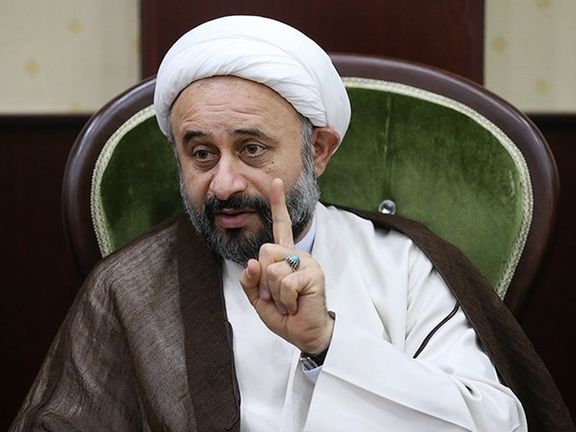
Naqavian stressed, however, that he is not a "counter-revolutionary" or a member of the opposition. "I simply oppose the policies I believe are wrong and want those policies to be corrected."
The growing divide between the Iranian public and the ruling clerics has been acknowledged by the country’s seminaries as far back as 2017. A major media outlet from the Qom Seminary, Mobahesat (Discussions), explored this issue and its underlying causes. Studies published by Mobahesat revealed that clerics' popularity has been in decline since the 1979 Islamic Revolution.
Several debates involving prominent Muslim scholars were sparked by the publication, during which high-ranking seminarians concluded that the public’s increasingly negative view of the clergy stems largely from the behavior of clerics who serve as state officials.
In 2023, following a series of physical attacks on clerics in the wake of the 2022 nationwide protests, Ayatollah Mohammad Javad Alavi Boroujerdi argued that these assaults were a direct result of the widening divide between the public and the clerical establishment. He urged officials to avoid further alienating the people by making hardline statements that fuel public resentment.
However, to shield himself from potential government reprisals, Boroujerdi also attributed the growing hostility toward clerics to foreign media "fanning the flames" of discontent.
In contrast, female religious scholar Sedigheh Vasmaghi, a vocal critic of the regime’s compulsory hijab policy, argued that it was already too late to bridge the gap between clerics and the people. She asserted that the clerics’ fundamentalist views had fostered insecurity in Iranian society, adding that they should have anticipated the consequences of their hardline stances and behavior.
In his interview, Naqavian noted that the government labels reformist clerics as counter-revolutionaries. He also revealed that, due to the public's increasingly negative perception of clerics, he often refrains from wearing his traditional clerical robe and turban when going about his daily life.
When asked about the difference in how people react to him in clerical versus non-clerical attire, Naqavian explained, "For those who know me, their reaction doesn’t change regardless of what I wear. But for others, it’s different. When they see me in my clerical robe and turban, they treat me the same way they treat other clerics."
During and for some time after the 2022 protest in Iran "turban tossing" or "turban flipping" was popular among young protesters. Young disgruntled people used to take the turban off the clerics' head and toss it in the street. Compared to violent attacks on clerics at that time, turban tossing was a light-hearted reaction.
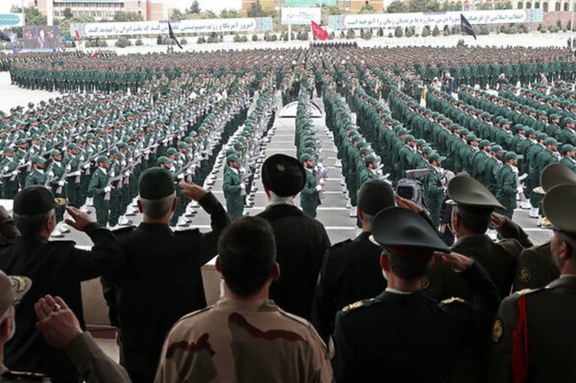
Details of the Iranian government’s budget bill for next year show that more than half of the state’s total revenues from oil and gas exports will be allocated to the country's Armed Forces.
According to the budget bill, the Iranian government is projected to receive approximately 37.5% of the country’s total oil and gas export revenues, amounting to around €24 billion.
Of this amount, 51%—approximately €12 billion—will be allocated to military funding.
Officially known as the Islamic Republic of Iran Armed Forces, they consist of the Army, the Islamic Revolutionary Guard Corps (IRGC), and the Law Enforcement Forces (LEF).
From the remaining funds, 42.5% will go toward the government’s operating budget, and 6.5% will be earmarked for "special projects."
In the budget bill, the official exchange rate for the euro has increased from 310,000 rials this year to about 502,000 rials next year. Because of this change, the armed forces’ income from the government’s oil revenues will rise sharply. Next year, their income will exceed €12 billion, compared to €4.3 billion this year and €3 billion the previous year.
In practice, the government will provide the Armed Forces with oil valued in euros, which they can then sell to foreign buyers.
With the price of oil set at €57.5 per barrel in next year's budget, this allocation amounts to a daily delivery of 583,000 barrels to the military.
Tanker tracking data indicate that the IRGC exports around 85,000 barrels of oil per day to Syria. As a result, most of the oil allocated to the Armed Forces is expected to be directed to China – which accounts for 95% of the country’s total oil exports.
This year, the Armed Forces' share of oil exports exceeds 200,000 barrels per day, with less than half going to Syria and the remainder directed to Chinese markets.
In addition to other measures targeting the IRGC, the US has repeatedly imposed sanctions on networks affiliated with the state’s paramilitary forces for smuggling oil.
Some of these networks operate out of the UAE and East Asian countries, particularly China and Hong Kong.
In addition to the share from the government’s oil exports, the Armed Forces also receive financial resources from other lines within the total state budget.
This year, the total budget allocated to Iran's Armed Forces is estimated at around $17 billion, including $4.5 billion worth of oil cargoes.
The draft of next year's budget, made available to the media, does not mention other budget lines related to the Armed Forces.
Government's reliance on oil and gas revenues to finance budget
In total, based on figures from the budget bill, the government expects €64 billion in oil and gas export revenues for the country.
Of this amount, €4.8 billion is expected to come from gas exports (16 billion cubic meters at a price of 30 cents per cubic meter), and €59 billion from oil and petroleum product exports.
According to Iran's customs reports, the country’s total revenue from oil and petroleum product exports last year was approximately $37 billion, and in the first half of this year, it has already reached $24 billion.
The budget bill does not specify the expected oil export volume, but it indicates that the government plans to increase daily crude oil production by 350,000 barrels year-on-year, bringing it to 3.75 million barrels per day next year.
Since Iran will not be launching any new oil refineries in the next two years, the entire increase in oil production is intended for export.
The government has also stated in the budget bill that, although the National Development Fund’s share of oil export revenues is 48%, the actual share will be 20%, with the remaining 28% (€17.9 billion) loaned to the government.
As a result, next year, 65.5% of oil and gas export revenues will flow into the government budget, 14.5% will go to the National Oil and Gas Companies, and 20% will be allocated to the National Development Fund.
To cover the budget deficit, the government has borrowed over $100 billion from the National Development Fund and has been unable to repay it. This continued borrowing jeopardizes the future of the Fund’s assets, which were primarily intended for lending to the private sector.
Recently, the head of Iran's National Development Fund revealed that the foreign currency reserves of this financial institution have nearly been depleted, and the government is unable to repay its debts.
The government is also expected to earn €4.5 billion from the internal sale of petroleum products and gas.
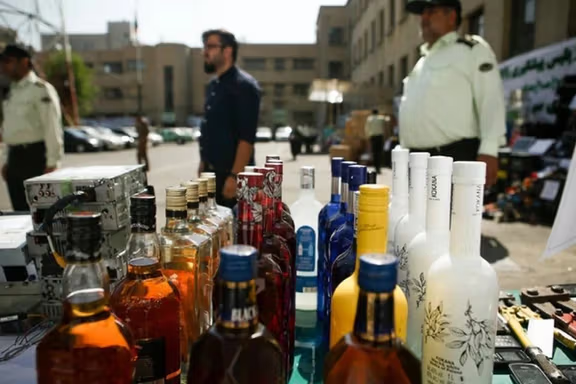
As fatalities from methanol-laced alcohol continue under the Islamic Republic's prohibition, several experts are casting doubt on the Iranian authorities' narrative that these deaths are merely isolated incidents.
Year after year, the sale of bootleg alcohol in Iran has remained a persistent crisis, with at least thousands of Iranians falling victim to poisonings.
According to Iranian medical authorities, 768 people were poisoned by methanol-laced alcohol in just one month in 2018, resulting in 96 deaths across eight of Iran’s 31 provinces.
More recently, in the first 10 days of October, 343 people were poisoned, with 41 deaths reported in the provinces of Mazandaran, Gilan, Hamedan, and Kurdistan.
Alcohol has been banned in Iran since the 1979 Islamic Revolution, with consumption, production, or sale of alcoholic beverages punishable by imprisonment, flogging, or fines. Repeat offenders can even face the death penalty. Despite this, alcohol consumption continues, with both imported and homemade drinks readily available on the black market.
This week, the state's judiciary oversaw the execution of four people, over the purported sale of alcoholic beverages laced with methanol.
Iranian authorities have labeled this incident -- and previous ones -- as a profit-driven criminal operation. The judiciary echoed that characterization, saying that the individuals executed on Wednesday intentionally sold methanol-laced alcohol for financial gain.
The judiciary-controlled Mizan outlet reported that the individuals involved "purchased methanol at one-eighth of the market price of ethanol and sold it at approximately one-third of the market rate."
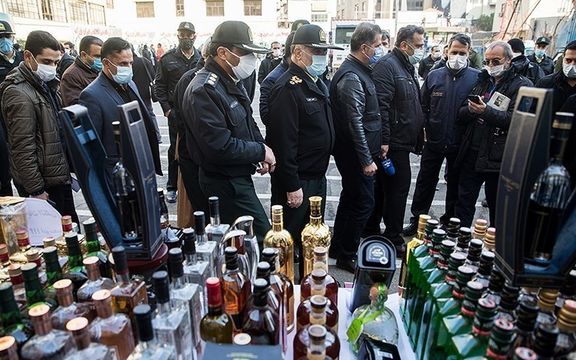
That narrative was repeated by the hardline newspaper Iran, which quoted a clinical toxicology expert as saying, "No seller or ‘dealer’ deliberately endangers their customers, but when profits and higher income are at stake, such incidents become unavoidable."
However, some experts question whether this is merely a matter of greed or if more complex motives are at play.
According to Dr. Maziar Ashrafian Bonab, a PhD graduate from Cambridge University, the nature of these poisoning cases defies the notion of a random or accidental occurrence. Speaking in an interview with Iran International, he said:
"We expect to see a uniform spread of deaths across the country due to the occasional use of counterfeit alcohol. But the data reveals concentrated spikes in specific provinces at certain times, which suggests a more organized and deliberate effort rather than random errors."
Dr. Bonab, a former Director General of the Forensic Medicine Center of Iran’s Hormozgan Province, said that while small-scale producers might inadvertently mix methanol into their products, the scale and coordination of these poisoning incidents point to larger networks with access to industrial alcohol or methanol. He further argued that it's unlikely that those selling counterfeit alcohol would intentionally poison their customers:
"If anything, poisoning your customers would harm your business in the long run. This doesn’t seem like a profit-driven mistake but rather a more sinister act."
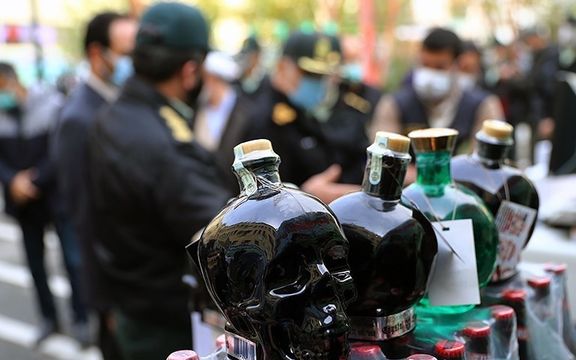
When asked who might be behind these incidents, Dr. Bonab hypothesized that some organizations involved in methanol production could be connected to powerful state institutions:
"There is reason to believe that those responsible have access to large quantities of industrial methanol, which isn’t easily available to small producers. Some of these operations could involve pharmaceutical companies or other institutions with government links. I have even heard rumors that certain networks, possibly tied to powerful entities, may be behind these poisonings, operating with a level of impunity."
The former aide to Iran's Health Ministry also highlighted the involvement of "fire-at-will" groups—radical elements that act independently or with implicit approval from factions within the government:
"Some of these groups believe it’s their duty to impose their ideological beliefs on society, even if it means using lethal force. They see alcohol consumption as a vice and might be deliberately targeting consumers."
The so-called moderate outlet Etemad similarly highlighted these suspicions in a recent report, featuring addiction specialists and alcohol distributors who questioned the scale and coordination of the methanol poisonings.
An anonymous addiction specialist from Gilan Province suggested the incidents indicate more than just a technical error:
"When poisonings occur simultaneously in four provinces, it becomes clear this goes beyond production issues. Even if deliberate poisoning is assumed, it’s unlikely that four different producers in separate provinces would simultaneously produce tainted alcohol. This raises concerns that something more organized is at play."
Likewise, Ali Salarian, an addiction specialist from Mazandaran Province and a member of the National Medical Council, echoed these concerns, stressing that the scope and frequency suggest something far more deliberate than a mere production error:
"Food and drink poisonings, whether legal or illegal, are usually due to isolated technical errors. But given the scale and impact of these cases, it’s clear this is not accidental. Malicious intent seems likely."

Etemad also spoke to an anonymous producer of alcoholic beverages to address the theory of rivalry-driven revenge between sellers.
The source dismissed this notion, saying, "This isn’t the work of a typical vendor. A vendor is someone who has been producing and selling for years, building a reputation for their product. They know they’re operating outside the law, as alcohol production and sales are illegal in Iran, but they’re not murderers".
"While there are dangerous criminals in the alcohol trade, none would kill their customers to outcompete others. Their livelihoods depend on keeping their customers, not eliminating them," he added.
Etemad also pointed to a past pattern, stating, "Years ago, similar incidents occurred in some provinces, where a specific group deliberately inflicted severe, irreversible physical harm on certain citizens, but the identity of these individuals was never revealed to the public."
While Etemad doesn’t specify which incidents they are referring to, it appeared to draw parallels to the school poisonings during the 2022 nationwide protests against the state -- dubbed the Woman, Life, Freedom movement.
These poisonings, which primarily affected girls' schools across Iran, began during the protests and continued until April 2023. Schoolgirls experienced symptoms like shortness of breath and lethargy.
Initially dismissed by authorities as "children's pranks" or attributed to faulty heating, the government later admitted that at least 1,200 students had been affected by mysterious fumes.
At the time, suspicions pointed toward hardliners or religious extremists, possibly punishing girls for speaking out during the protests. Other activists described the poisonings as "state terrorism" and "gender-based" -- pointing the finger at state authorities citing the organized scale of the attacks.

Mohammad Eslami, head of Iran’s Atomic Energy Organization, warned Israel that Iran is prepared for retaliation following Tehran's aerial barrage, while Israel's defense minister said that the upcoming strike would demonstrate Israel's might to the Islamic Republic.
Speaking on the sidelines of a cabinet meeting, Eslami said: “If the enemy makes even the slightest attack on our [nuclear] facilities, we will deliver a crushing response."
He told the cabinet that "our defense and security capabilities have always been prepared to confront such threats with vigilance".
Since at least 2010, Israel has allegedly conducted dozens of attacks inside Iran, targeting sensitive nuclear and military installations and carrying out assassinations of individuals deemed a threat.
The attacks became more frequent after July 2020, when a massive explosion occurred at the Natanz uranium enrichment site in central Iran, destroying one of the buildings.
In November that year, Mohsen Fakhrizadeh, a key figure in Iran’s nuclear program, was assassinated in a roadside attack near Tehran. Western and Israeli intelligence had long suspected Fakhrizadeh of being the architect of Iran’s covert nuclear weapons program.
Iran has long said its nuclear program is peaceful. The UN's nuclear chief, Rafael Grossi, said this year that Iran is "weeks not months" away from a nuclear weapon while a third of the UN's inspectors have been barred.
Eslami's latest warning comes as Israel prepares its retaliatory attack after the Islamic Republic launched 181 ballistic missiles towards Israel earlier this month.
The latest bombardment on Israel, the second this year, saw Iran target the likes of intelligence and military sites, with damage caused to civilian areas including a school.
On Wednesday, Israeli Defense Minister Yoav Gallant told Air Force crews at Hatzerim Air Base the counterattack would levy "a heavy price".
"After we attack Iran, everyone will understand your might," he said, in a video shared on X.
US President Joe Biden made clear that while he supports a retaliation, he will not support an attack on Iran's nuclear facilities.
Israel's Prime Minister, Benjamin Netanyahu, and the country's military leadership, have since remained tight-lipped on the nature and timing of the retaliation.
The head of Iran's Passive Defense Organization, Gholamreza Jalali, lauded the escalating conflict between the Islamic Republic and its archenemy, Israel.
“This year, we are in a situation where the axis of resistance is engaging with the Zionist regime and its allies," he said. In the wake of the Gaza war, Israel is fighting threats from Iran's proxies around the region across its borders.
Additionally, Israel says it foiled five Iran-backed plots this month, with spy cells allegedly attempting high level assassinations on political, military and nuclear figures.
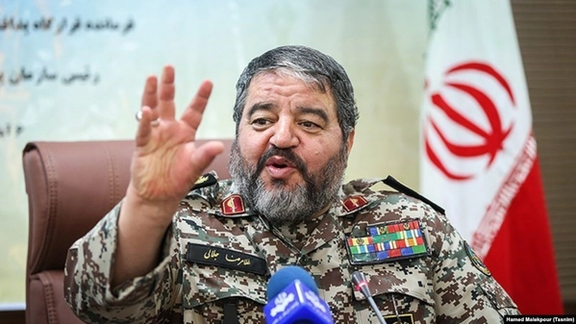
In a statement reported by the IRGC-affiliated news outlet Fars, he said that eight new defense plans have been devised and endorsed by Iran’s Supreme National Security Council.
Jalali also discussed efforts to bolster Iran’s infrastructure against potential cyber-attacks and sabotage.
Referring to recent incidents including the explosions of Hezbollah pagers which saw at least 1,500 operatives in Iran's largest militia taken out of action, he noted that the Passive Defense Organization had taken steps to prevent similar attacks in Iran.
“Since last year, we have been insisting on the use of artificial intelligence to prevent such incidents within the country,” Jalali stated as the importance of defense against cyber attacks grows.
However, Iran remains vulnerable to hacking and cyber-attacks. In September, Iran's Cybersecurity Strategic Management Center issued a red alert for financial, monetary, and communication sectors, and an orange alert for other sectors.
"Organizations are advised to maintain round-the-clock availability of technical teams and rapid response units due to the potential for cyber attacks," a statement said.
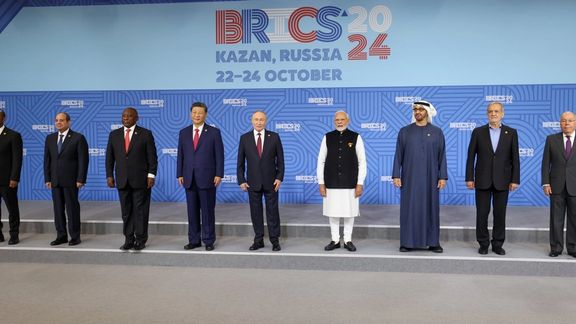
Russia and China pledged on Wednesday to deepen ties with Iran and jointly challenge the U.S.-led global order at an economic summit hosted by President Vladimir Putin.
Putin and Chinese president Xi Jinping met Iran's president Masoud Pezeshkian separately on the sidelines of the BRICS summit in Kazan, Russia.
Both leaders framed their relations with Tehran as a central part of their effort to counter Western dominance and promote a multipolar world.
"The approaches of Russia and Iran to the global agenda are close or completely coincide," Putin said in a joint appearance, adding that both nations are united by "the desire to form a fair multipolar world order."
Xi also highlighted Iran's role in the unwritten alliance of American adversaries, saying, "the strategic significance of China-Iran relations has become more prominent", according to China's Xinhua news agency.
Western governments, particularly officials in the United States, see China, Russia, and Iran as adversaries. The Russian invasion of Ukraine, rising tensions between Iran and Israel, and the fate of Taiwan have added to the antagonism.
Strategic agreement
Pezeshkian echoed the sentiment with a blunter tone: "We have to disrupt the global domination that is (the West's) intention and be able to cooperate with each other in economy, politics, culture, science, and technical spheres," he said.
Both leaders hailed the strengthening of ties, promising they will become even stronger with the signing of a Comprehensive Strategic Partnership Agreement.
The official signing may be due in Moscow between Putin and Pezeshkian after the BRICS summit in Kazan. However, the two sides have made similar promises on several occasions in the past, without the treaty being finalized.
Kremlin spokesman Dmitry Peskov had refused to comment earlier when asked whether that agreement will include mutual military assistance.
The summit is the first since Iran, Egypt and the UAE joined BRICS as full members – with the goal of reducing reliance on Western-dominated institutions like the IMF and World Bank.
With Iran facing significant economic challenges, Pezeshkian's appearance at the BRICS leaders' meeting will likely see him attempt to strengthen and further financial and trade ties.

Geopolitics
US and Western sanctions over accusations Iran sponsors terrorism have taken a toll on the country’s economy – trade between Iran and its largest trading partners has also declined further in 2023.
Iran’s main customer for oil, China, significantly reduced its purchases this year. Adding further to its strain, Tehran saw a 26% drop in trade with India, a 17% decline with Russia, and a 33% falloff with Turkey.
Ahead of the summit, Iran's central bank governor, Mohammad-Reza Farzin, revealed Tehran’s intent to join the BRICS-led New Development Bank. The move signals official efforts at development independent of the World Bank and other Western financial systems – a priority the central bank chief suggested would be central to discussions at the summit.
Iran’s focus will also be geopolitical, as the state braces for a promised Israeli attack after its own barrage of missiles into Israel on October 1.
Given Iran's support for Russia in its invasion of Ukraine, Pezeshkian may seize this opportunity to seek assurances for advanced weapons, such as long-range air defense systems and fighter jets.
Tehran has provided Moscow with hundreds of drones and helped launch their production in Russia, allowing for a constant barrage of long-range drone strikes at Ukraine’s infrastructure. In September, US Secretary of State Antony Blinken confirmed that Iran had provided close-range ballistic missiles to Russia.
Russia, meanwhile, has made it clear that it will not abandon Iran, amid the threat of an Israeli retaliation, as confirmed by a Kremlin spokesperson to CNBC on Tuesday.
“We are developing cooperation with Iran in a variety of areas. We intend to do this further,” Kremlin Press Secretary Dmitry Peskov said.
However, as Iran's regional presence has been seriously threatened by Israel, which also intends to launch an attack to punish Tehran for its October 1 missile attack, there is little Russia can do. Last week, Iranian media hinted at some sort of Russian or Chinese mediation in the Middle East, but there is little sign of either.
For Putin, the summit is a way to demonstrate that Russia is far from isolated, showcasing unity among its allies on the global stage. This, despite many attendees—including Saudi Arabia and Iran—harboring longstanding disagreements.
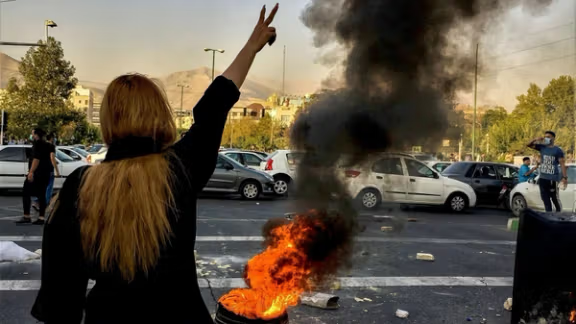
Israel's impending strike on Iran could present a pivotal opportunity for dissidents to challenge and potentially overthrow the clerical government, according to an Iranian-Canadian human rights expert, and a former advisor to Israel’s Prime Minister.
As the word awaits Israel’s response to Iran’s Oct 1. barrage of more than 180 ballistic missiles on the Jewish state, lawyer and advocate Kaveh Shahrooz told Iran International there are creative ways to respond to Iran’s aggression that could secure a country no longer under Islamic rule.
Speaking over zoom, Shahrooz told Iran International this would involve the West training and funding Iran’s opposition to bring the Iranian establishment down.
Shahrooz suggests utilizing tools like unrestricted internet access, which the government routinely blocks at the first sign of protests, and funding a massive strike fund for Iranian workers to cripple the economy—particularly by targeting critical infrastructure such as the oil industry.
He acknowledged that Israel must respond to Iran’s ballistic missile attacks, proxy threats, and other aggressive actions. However, he emphasized that Israel’s long-term success hinges on empowering Iranian dissidents to overthrow their government. While targeting Iran’s nuclear capabilities is understandable, Shahrooz argued that eliminating future threats requires the complete end of the Islamic Republic.
“Iranian protestors are ready to get back onto the streets. The level of anger that Iranians have at the regime is palpable,” he said.
Alex Selsky, an advisor to the Middle East Forum and former advisor to Israeli Prime Minister Benjamin Netanyahu, said Israel’s next strike should encourage the overthrow of the Islamic Republic.
“All of us hope that this strike can be a game changer for the opposition and for the people in Iran,” said Selksy over zoom in Israel.
The Netherlands-based Gamaan institute conducted an opinion survey in 2023 finding that more than 80 percent of 158,000 respondents in Iran reject the Islamic Republic and prefer a democratic government.
“We really hope that this is an opportunity that we will not miss, that Israel will not miss, that the West will not miss,” he added.
Selsky said he’s in touch with Iranian dissidents, who he said have suffered the most at the hands of Iran's authorities and understand the Iranian threat better than anyone.
He foresees Israel's future strike, no matter the target, as one that will weaken the establishment, but he stressed it must aim at supporting the people of Iran seeking change.
Since the "Woman, Life, Freedom" uprising, Iranian authorities have escalated their use of the death penalty. In 2023, executions reached an eight-year high, with Amnesty International reporting that the regime used the death penalty as a tool of oppression, particularly against the persecuted Baluch minority, who suffered a disproportionate number of hangings.
According to Amnesty International, Iran has arbitrarily executed 10 men since December 2022 in relation to the September-December 2022 protests.
Both Shahrooz and Selsky agree the Iranian people have proven that they have risked their lives to achieve freedom - knowing they risk executions and torture. The United Nations Fact Finding Mission found Iran committed crimes against humanity against its own people.
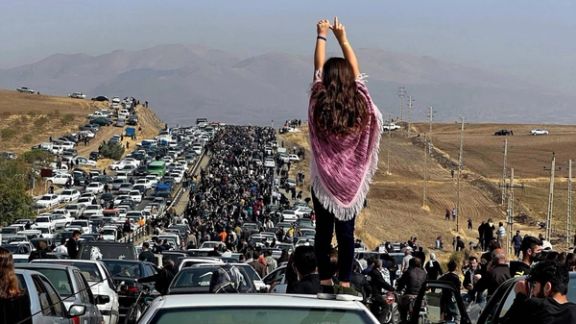
Ultimatum to Iran: Free your people or face attack
Shahrooz said there’s another alternative: give Iran an ultimatum – put down your guns and agree to free and fair referendum on Iran’s future – and you will be allowed to go into exile with your money or Israel will attack.
“The Iranian regime is a paper tiger,” said Shahrooz, who added that Iran’s capabilities and deterrence power have been decimated by Israel in recent weeks.
Since Oct 7, Israel has focused on weakening Iran’s proxies. The leader of Hamas Ismail Haniyeh was assassinated in Tehran while visiting the country for the inauguration of its new president, Masoud Pezeshkian, on July 31. Israel has not claimed responsibility but is believed to be behind the attack. Then, Yahya Sinwar, the mastermind of Oct 7 was killed in Gaza. The leader of Hezbollah, Hassan Nasrallah, once thought untouchable by many observers, was killed in an Israeli airstrike in Beirut.
On 17 and 18 September, thousands of pagers and hundreds of walkie- talkies belonging to Hezbollah operatives exploded simultaneously across Lebanon and Syria in a coordinated Israeli attack. The killed at least 42 people, including at least 12 civilians, and injured more than 3,000.
Hamas, military and political capabilities, have been obliterated although supporters and fighters do still exist, and Hezbollah is wounded but not out.
If Iranian authorities are given an ultimatum, Shahrooz believes they will take it to hold onto the wealth they’ve amassed since the inception of the Islamic Republic in 1979. Selsky pointed out that he believes people within the Iranian establishment are likely there for money and power.
Prime Minister Benjamin Netanyahu directly addressed the people of Iran in a prerecorded video three weeks ago, saying "Israel stands with you."
The question now: will Israel's next strike put those words into action and support Iranian opposition?